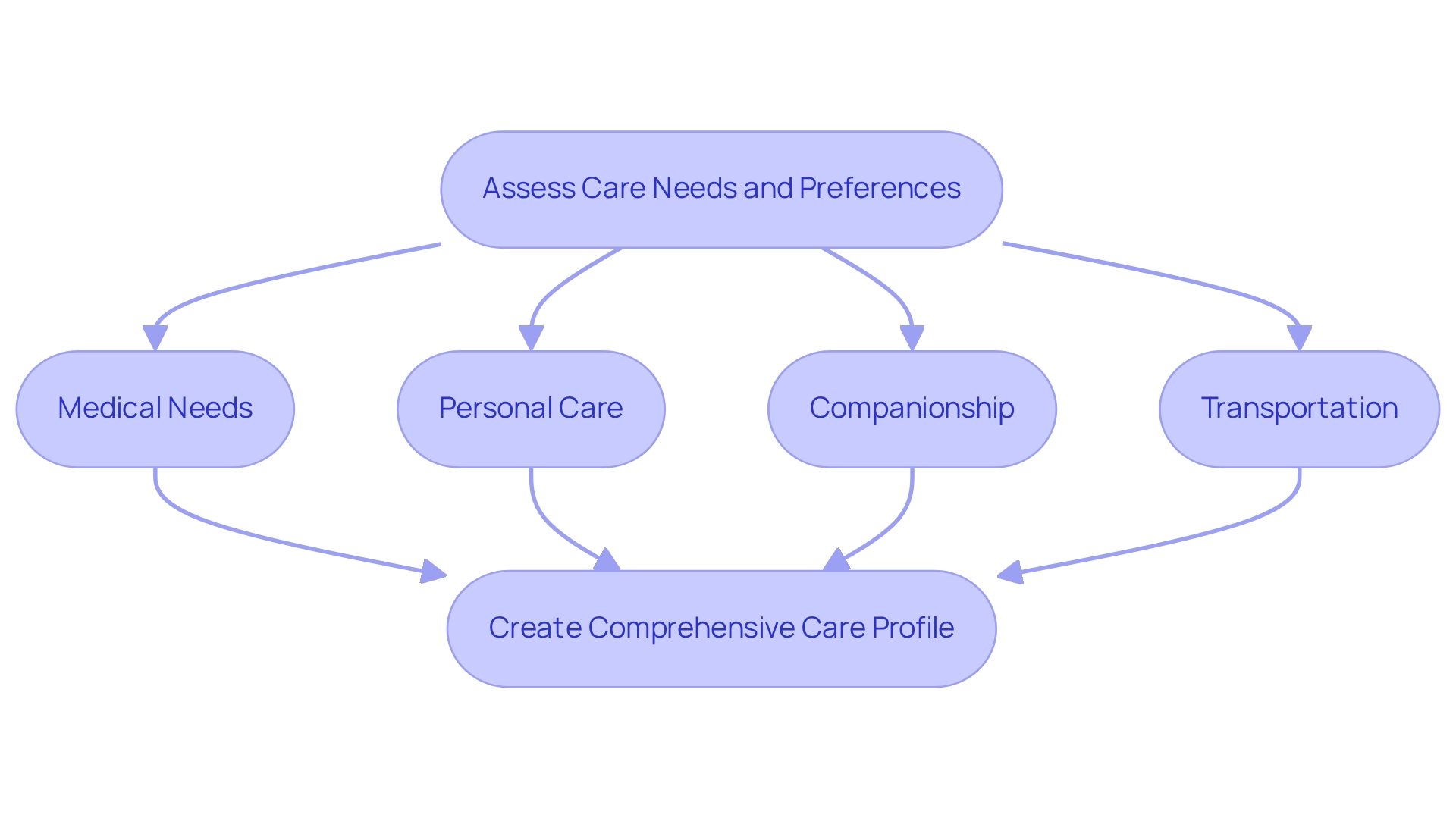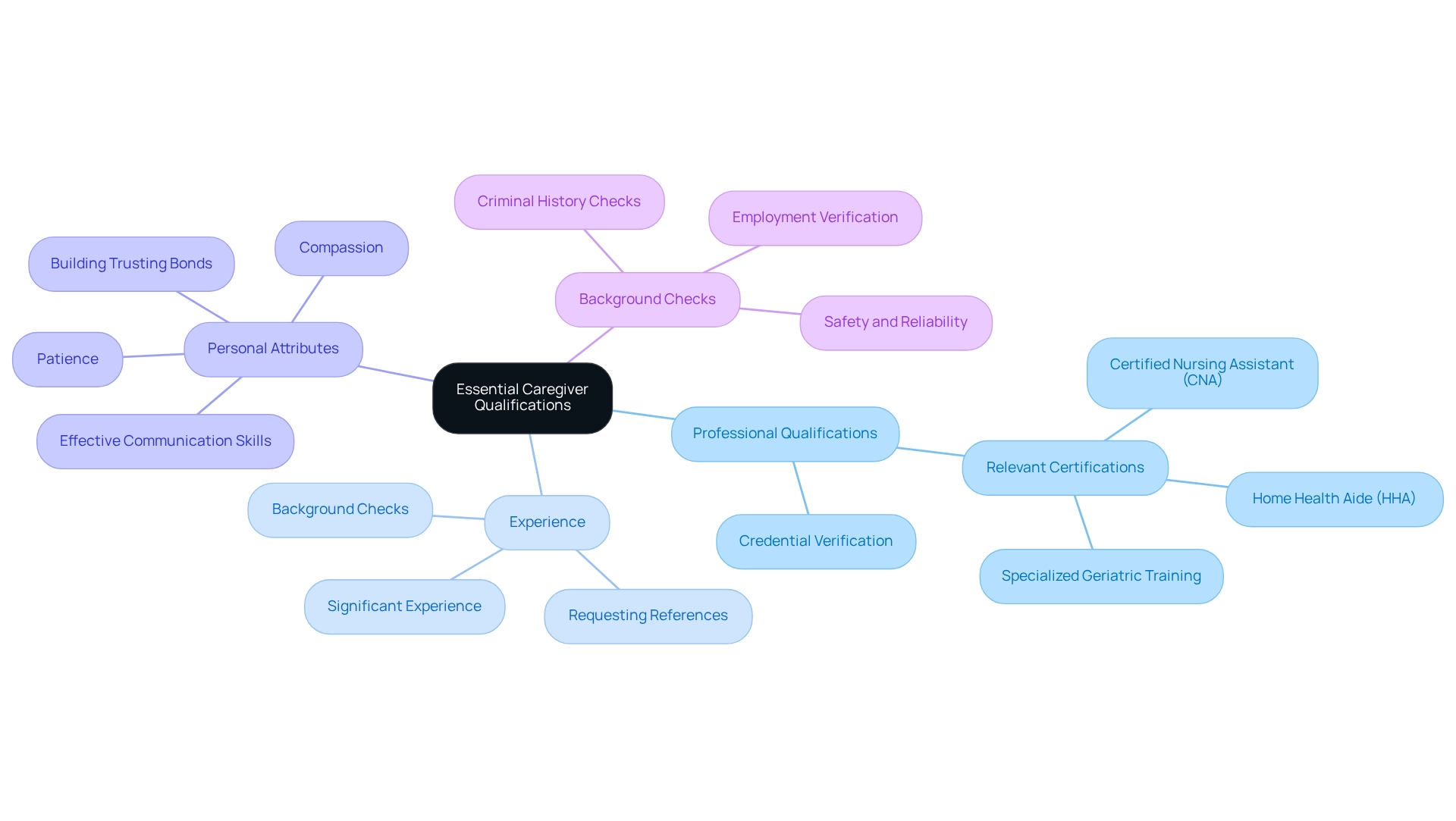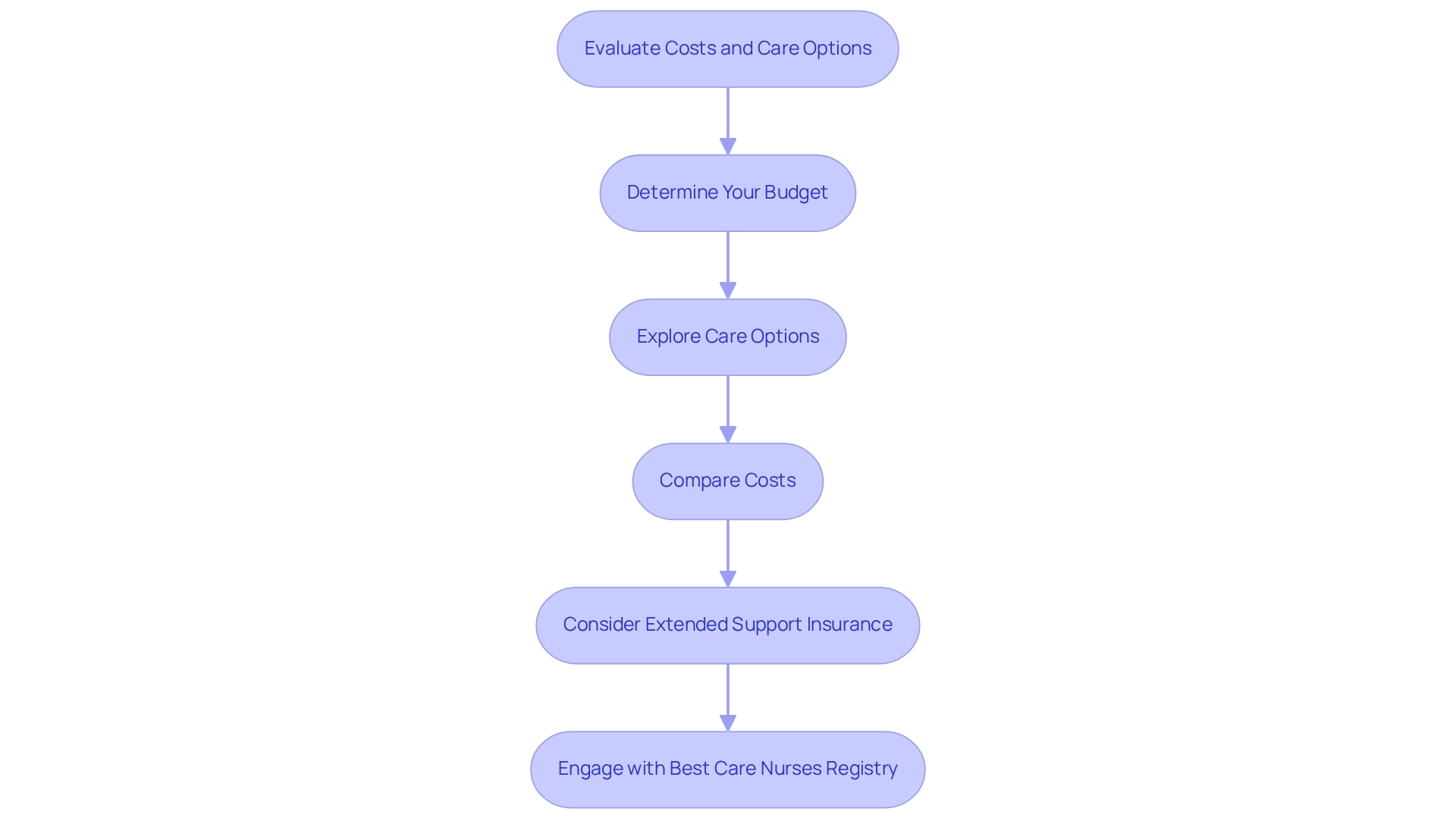Overview
Choosing the right adult caregiver for your needs can feel overwhelming, but it’s important to approach this decision with care and compassion. Start by assessing your specific care requirements and identifying the essential qualifications that caregivers should possess. Understanding the costs and available care options is also crucial.
In this journey, remember to involve the individual who will receive care in the assessment process. Their voice matters, and it’s vital to ensure that caregivers have the necessary certifications and experience to provide the best support. As you navigate through different care arrangements, take the time to understand the financial implications, as this will help you make informed decisions.
Ultimately, our goal is to enhance the quality of life for your loved ones. By taking these steps, you can feel confident that you are making the right choice. We’re here for you every step of the way, ensuring that your comfort and the well-being of your family are our top priorities.
Introduction
Navigating the world of caregiving can feel overwhelming, especially when it comes to ensuring that your loved ones receive the tailored support they truly need. We understand that assessing medical requirements and identifying the right caregiver qualifications are significant steps that can enhance the quality of life for seniors.
With a variety of care options available and costs to consider, families often find themselves wondering how to make informed decisions that harmonize care with budgetary constraints.
This guide explores the essential aspects of selecting the right caregiver, ensuring that every individual receives the compassionate and competent assistance they deserve.
Remember, you are not alone in this journey; we’re here for you every step of the way.
Assess Care Needs and Preferences
-
Begin by recognizing the unique needs of the individual in need. Consider the following aspects:
- Medical Needs: Is assistance required with medication management, mobility, or specialized medical care? Certified Nursing Assistants (CNAs) are trained to handle essential medical tasks, such as taking vital signs and administering medications, which can be crucial for those with chronic conditions or recent surgeries.
- Personal Care: Does the individual need help with daily activities like bathing, dressing, or grooming? Home Health Aides (HHAs) specialize in personal care and daily living activities, ensuring seniors maintain their dignity and comfort.
- Companionship: How important is social interaction for the individual’s emotional well-being? Signs of social isolation, such as loneliness or withdrawal, may indicate a need for companion or sitter services, which can provide emotional support and enhance quality of life.
- Transportation: Is assistance necessary for attending appointments or running errands? Companion services provided by an adult caregiver can be tailored to meet specific needs, offering flexible support that ranges from a few hours a week to full-time care.
Involve the individual in the assessment process whenever possible. Discuss their preferences regarding support providers, including desired gender, age, and personality traits that would promote comfort and trust. Document all findings to create a comprehensive care profile. This profile should be shared with prospective guardians or agencies to ensure clarity and alignment on expectations and requirements. Involving seniors in this process not only honors their independence but also increases the chances of a successful support match, ultimately enhancing their quality of life. Remember, we’re here for you, and your comfort is our priority.

Identify Essential Caregiver Qualifications
- Professional Qualifications: When selecting an adult caregiver, it’s essential to prioritize individuals with relevant certifications, such as Certified Nursing Assistant (CNA), Home Health Aide (HHA), or specialized training in geriatric support. Verifying their credentials ensures they are current, reflecting their commitment to maintaining high standards in elderly care. The adult caregivers referred by Best Care Nurses Registry undergo careful screening and are dedicated to excellence, ensuring your loved one enjoys healthy, meaningful days at home.
- Experience: Choose adult caregivers who possess significant experience assisting individuals facing similar health challenges. A provider’s background can profoundly influence the quality of support offered. Requesting references and conducting thorough background checks will help confirm their experience and track record. Notably, the growing demand for personal support aides highlights the necessity for agencies to enhance their workforce, ensuring assistants are well-prepared to meet clients’ needs.
- Personal Attributes: Evaluate personal qualities such as compassion, patience, and effective communication skills. A successful support provider should not only offer physical assistance but also foster a trusting bond with both the individual and their family. This emotional connection is vital, as experts emphasize the importance of leading with love in caregiving situations. Providers from Best Care Nurses Registry deliver tailored support solutions that alleviate stress and guarantee safety for seniors, enhancing their quality of life and autonomy.
- Background Checks: It’s crucial to ensure that any potential caregiver has undergone comprehensive background checks, including criminal history and employment verification. This step is essential for ensuring safety and reliability, providing reassurance for families entrusting their loved ones to an adult caregiver in home care. With 89% of patients indicating satisfaction with home health assistance in 2022, the importance of choosing skilled and reliable providers cannot be overstated.

Evaluate Costs and Care Options
-
Determine Your Budget: Begin by reflecting on your financial situation to establish a practical budget for support assistance. Consider important factors such as insurance coverage, savings, and potential financial assistance programs. With the average expense for support reaching around $6,292 per month for 44 hours a week, understanding your financial landscape is essential.
-
Explore Care Options: Look into various types of caregiver arrangements to discover what suits your needs best.
- In-Home Care: This option allows you to hire a caregiver who provides personalized services in the comfort of your home.
- Agency Care: By partnering with a home health care agency, you gain access to trained, vetted, and reliable caregivers.
- Independent Caregivers: While hiring a caregiver directly may be more budget-friendly, it requires more oversight and management on your part.
-
Compare Costs: Gather quotes from different caregivers or agencies to understand the financial implications. As of 2025, the national median expense for nonmedical in-home assistance is about $33 per hour. Evaluating these rates in relation to your budget and the level of assistance needed will help you make a well-informed choice.
-
Consider Extended Support Insurance: If you have long-term support insurance, take the time to review your policy to identify included options and enhance your benefits. Many families navigate this process to ensure they receive the necessary support while managing costs effectively. Financial advisors often highlight the importance of budgeting for caregiver services, encouraging families to prepare for both expected and unexpected expenses in their planning.
-
Engage with Best Care Nurses Registry: Please call (888) 203-2529 to connect with our friendly staff about your needs. We are here to discuss your situation and work with your doctor to create a care plan that perfectly meets your requirements. Our compassionate caregivers are ready to provide the support you need, ensuring your comfort is our priority.

Conclusion
Selecting the right caregiver is a critical process that requires a deep understanding of the unique needs of the individual requiring care. By assessing medical, personal, and social needs, families can create a comprehensive profile that guides the selection of a caregiver. Engaging the individual in this process not only enhances the likelihood of a successful match but also ensures that their preferences and comfort are prioritized.
Identifying the essential qualifications of caregivers is equally important. Professional certifications, relevant experience, and personal attributes such as compassion and effective communication significantly influence the quality of care provided. Conducting thorough background checks further ensures safety and reliability, giving families peace of mind as they navigate this vital decision.
Furthermore, evaluating costs and exploring various care options can help families find a solution that aligns with their budgetary constraints. Understanding financial implications, comparing quotes, and considering long-term care insurance are essential steps in making informed decisions.
In conclusion, the journey of selecting a caregiver does not have to be daunting. With a clear understanding of care needs, caregiver qualifications, and financial considerations, families can make empowered choices that enhance the quality of life for their loved ones. Compassionate, competent care is within reach, and by taking these thoughtful steps, families can lead to a more fulfilling caregiving experience for everyone involved.
Frequently Asked Questions
What should be considered when assessing care needs and preferences?
When assessing care needs and preferences, consider medical needs, personal care requirements, companionship, and transportation assistance.
What types of medical needs might require assistance?
Medical needs that may require assistance include medication management, mobility support, and specialized medical care, which Certified Nursing Assistants (CNAs) are trained to handle.
What role do Home Health Aides (HHAs) play in personal care?
Home Health Aides (HHAs) specialize in providing personal care and assistance with daily living activities such as bathing, dressing, and grooming, ensuring seniors maintain their dignity and comfort.
How can companionship impact an individual’s emotional well-being?
Companionship can significantly enhance emotional well-being by providing social interaction, which helps combat signs of social isolation, such as loneliness or withdrawal.
What transportation assistance options are available?
Companion services provided by adult caregivers can assist with transportation needs, helping individuals attend appointments or run errands, with support tailored to specific requirements.
How can the individual be involved in the assessment process?
Involve the individual in the assessment process by discussing their preferences for support providers, including desired gender, age, and personality traits, to promote comfort and trust.
Why is it important to document findings during the assessment?
Documenting findings creates a comprehensive care profile that can be shared with prospective guardians or agencies, ensuring clarity and alignment on expectations and requirements.
What is the benefit of involving seniors in the care assessment process?
Involving seniors in the care assessment process honors their independence and increases the chances of a successful support match, ultimately enhancing their quality of life.











